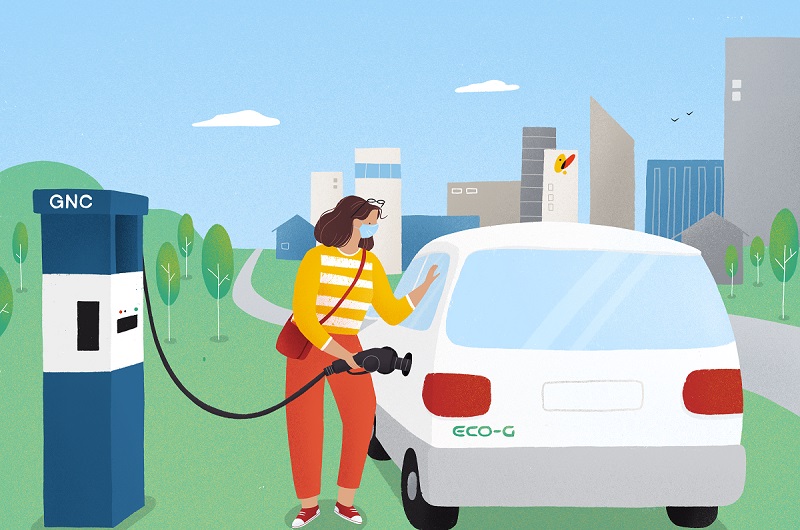During the past year, we have continued to progress in our commitment to energy transition by conveying 1,262 GWh of natural gas through our networks that was used for sustainable mobility.
During a complex financial year characterised by reduced mobility associated with the effects of COVID-19, conveyed gas only saw a 5% downturn, compared to 1,326 GWh in 2019. It was a year that saw dampened growth in the consumption of natural gas for vehicles in Spain, which had previously grown at a rate of 33% over the last five financial years.
By autonomous community, our natural gas networks in the Community of Madrid and Catalonia headed up the ranking of zones that conveyed the greatest amount of ECO-G, with 50% and 27% respectively. These data coincide with the figures provided by GASNAM (Iberian association that promotes natural gas, renewable gas and hydrogen in land and sea mobility), which also places Madrid and Catalonia as the autonomous communities that recorded the greatest number of natural gas vehicle registrations during the past year (3,197 and 1,093 vehicles) and the communities with the greatest number of public refuelling stations (20 and 18, respectively).
In terms of the number of refuelling stations connected to our natural gas network, during 2020 three new facilities were added (two public refuelling stations in Dos Hermanas and Granada and a private one in Valladolid), meaning that there are now near a hundred public and private refuelling stations connected to our natural gas network. At present, the number of ECO-G refuelling stations in Spain has almost reached 140 public installations.
Better air quality
The use of natural gas as fuel has important environmental benefits, such as improved air quality, because it reduces the emission of nitrous oxides by over 85% and suspended particles (the main cause of breathing and heart problems linked to pollution in urban areas) by almost 100%. Moreover, natural gas engines produce up to 50% less noise emission and vibration than diesel engines.
Thanks to the use of ECO-G, during the past year over 64,300 tonnes of CO2 were prevented from being emitted into the atmosphere, the same amount of CO2 that is absorbed by more than 3.2 million trees in a surface area equivalent to twice the size of Casa de Campo park in Madrid.
An efficient and sustainable commitment
Sustainable mobility with natural gas, in addition to being technology that is mature, safe and offers quick refuelling, is the only alternative that offers solutions to all the needs of mobility, from the long-distance transport of goods to urban travel.
In addition, vehicles that use this fuel have the ECO label from the Spanish Directorate-General of Traffic (DGT), allowing them to enjoy a number of benefits including free circulation in the centres of large cities such as Madrid and Barcelona during periods of restricted access owing to episodes of high pollution, as well as tax incentives and tax credits in regulated parking areas, among others.
ECO-G is also a very competitive fuel from an economic point of view when compared with diesel and petrol, with savings of between 25% and 50% depending on the solution chosen.
According to GASNAM data, the natural gas vehicle fleet continues to grow in Spain and ended last year with almost 30,000 vehicles, a 25% increase compared to 2019. The biggest increase was in the private car segment, which grew by 30%, followed by the van segment, which increased by 27% to almost 5,400 vans.







